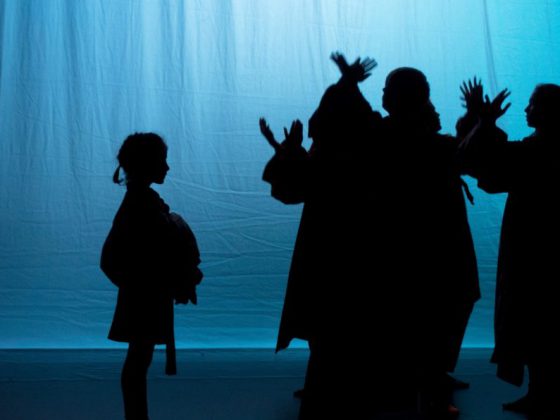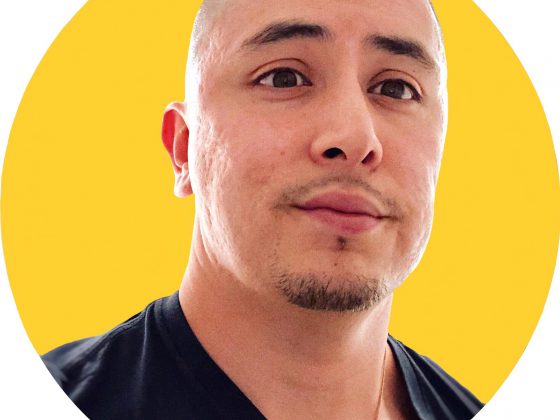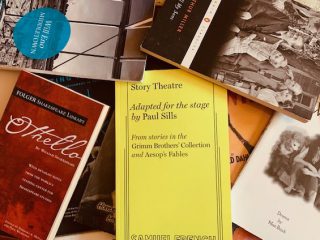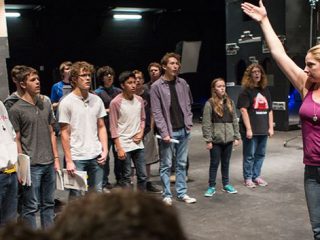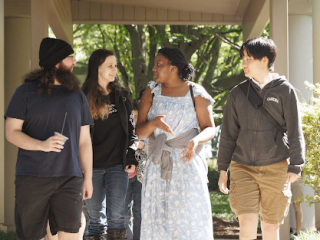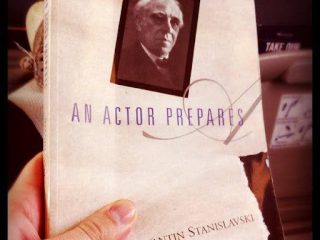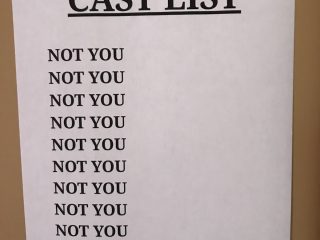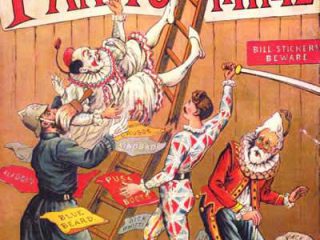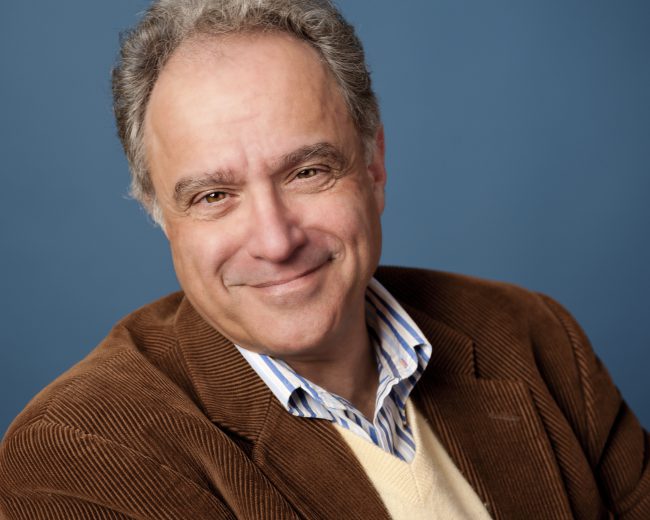
This is my second time working with Anthony Laciura, and being in the room with him again instantly reminds me how every moment working with him is a masterclass in expression, character, action, motion, emotion, and just pure passion and devotion for the art. In a stage rehearsal for a scene from Dvorak’s Rusalka on Thursday last week, he said something which really struck me: “if you love what you do, then tell the audience how much you love it with every move, with every breath, with every note”. That love is clear in all of his work, on the stage, acting and singing opera, in his work as Eddie Kessler in Boardwalk Empire, and in his directing and teaching activities.
I sat down with Anthony during his busy schedule to find out more about his life as a opera singer, specializing in character roles, his foundation ‘Anthony Laciura Foundation for the Arts’, and what advice he might have for anyone starting out today.
What is your first memory of being on stage?
Well, my first memory of being on stage was when I was 10, I was in the boys choir in New Orleans, with the New Orleans Opera. It was Tosca, and when I saw Scarpia’s entrance I was overwhelmed. They didn’t pay us, but they gave us tickets, so my father and I were sitting way up in the nosebleeds, and I told my father that’s what I wanna do for the rest of my life. That was the first time on a major stage. I have been entertaining my family and people in stores since I was, I guess, four years old.
Was opera and theater something that your family did?
No, they didn’t really know anything about it, except that my father loved it. Remember, my father had a 6th grade education, and my mother finished high school, and that was it. But my father deeply loved opera and was thrilled that his firstborn was going to probably be a tenor – haha!
What would you say is the best role you’ve ever done?
Probably The Simpleton in Boris Gudonov, I think, I loved that. Along with that, an opera that was never produced at The Metropolitan Opera, but many other regional companies did it, in 1976, John Philip Sousa’s El Capitan for which I played Don Medigua / El Capitan. That was, for me, that was… I just had such a good time. The other thing, other than opera, would then be Tevye in Fiddler on the Roof.
So you’ve worked in theater, musical theater, opera, TV, directing, and as a teacher…
And off-Broadway.
What would you say is the most demanding out of all of those?
Opera.
Opera is the most demanding, because you have all the art forms in one. And in the roles that I did, I tried to work out a dramatic situation that would match my voice, and reverse, the voice that matched the dramatic situation. Then you have all of this acting-reacting, whether it be spoken lines or sung lines. Which of course, sung lines are much harder.
Across your career, I know you’re a grandfather now, how have you found balancing such a big career on stage and having a personal life, and family life?
Great Wife. It’s just really that simple.
My wife was a ballerina, and she was wonderful. She decided that two people can’t do the same kind of profession. She never had that killer instinct, for lack of a better word, because she’s a lovely, gentle woman. She said, you do that, and I’ll teach and educate in English. So that’s what she’s been doing. Plus, later in life, in her 50s, she decided to get a degree in Law, so she’s actually a lawyer both in New York, and in New Jersey, but does not practice law, she still teaches.
So it’s a partnership.
It’s truly a partnership. One has to sacrifice more than the other, and in this case it’s been my wife. It’s just truly that.
You work with a lot of young singers in different contexts, what would you say is your main piece of advice for somebody entering the profession today?
Truly, listen to the music when you’re not singing. Analyse the music when you are singing, what’s happening orchestrally, or in the piano score, to find out the development of the character. Then listen to someone else, to give style, but not to try to sound like someone else. But to use the Italianate, if it’s Italian, the German…I think that’s very important. It’s the musical aspect that we need to become a part of. Our body needs to become a part of that. I know, maybe it sounds a little “new age”, but it’s really not, because the whole technique is bodily, physical. Our instrument is inside of us, therefore our emotions respond. How we feel generates how we sing, and if we’re feeling lousy we’ve got to act and use our technique, which must be incredibly strong, and solid, in order to do what we want to do and make it world class.
Would you say it’s more difficult today for people to get into theater, musical theater, or opera, than it was when you were starting out? Have you seen a change in the industry?
A big change in the industry. But the interesting thing is now there are so many venues, that I think, possibly, it’s hurting singers. When I was coming up we had very few venues. We had Santa Fe Opera, 1952, for a summer program. That was revolutionary, in the desert – and today it’s still magnificent. Then you had all the other ones creeping up. Historically I may be incorrect. But Glimmerglass started in a high school gym. That’s how they all started, and have grown exponentially.
Now, everybody has a Young Artist Program. The opera companies have a Young Artist Program, with a hope to have a feeder program into the opera company. Now, for those of us that specialized in character things, specialty roles, that took us out of the playing field. Because they would rather pay a young singer to do the part of Spoleta, or even The Simpleton, a singer that has not the idea of going in that direction. But, they have them in a Young Artist Program and they are utilizing them, and I understand that, truly, on a financial level – now more than ever before because I have a Foundation, and you have to do what you can financially to produce! Which has caused many of us to start Foundations, or Programs.
At the same time, it’s the same thing in movies and television. All of a sudden, even commercials are going to start doing full-length movies. So there’s an onslaught. When I go to auditions there are so many people, and the crazy thing is we all look alike for the roles that we’re auditioning! So you go for ‘old man’ part, the place is packed with all of us old men, you know!
You mentioned your Foundation, can you tell us a bit more about what the Foundation does?
Can I tell you more – are you kidding?!
I started – Lorraine Helvick and I were talking, and she said ‘why don’t you start a foundation?’ Well it’s something that I had always wanted to do. So, I said well, how do we go through it. Little by little we got things going and we established. I said let’s call it Anthony Laciura Foundation for the Arts. So I looked at the lettering and I thought ‘ALFA’; ‘Alfa’ and the Omega. I understand it’s not ‘a-l-p-h-a’ as it would be in Greek, but I am a devout catholic, and I thought well, this is asking me to give this to God.
You know, Danny Thomas did a great thing. When he prayed and said ‘Strengthen my career, help my career so that I can do good for others, and I promise I’ll build a hospital’, which of course, you know, was St. Jude’s.
So I thought well, if he could do it, why don’t I offer my foundation up and say, I’m going to build a school to help others enhance their careers, but most especially for the larger voices that some intendants don’t know what to do with, and are afraid to give a chance, because they haven’t had a lot of experience. Many of the wonderful Young Artist Programs stop around age 31, age 32, and these glorious voices are asking ‘where do I go, I’m past 32 years old and now I’m searching for competitions that will offer me some money for study?’ It’s just difficult. So, I said there needs to be some place. I thought well, you do it. With a great deal of help, and very little finances, here we are working on our second year as a foundation, and I’m very proud to say that it’s working very beautifully. We are working very hard, Lorraine, Samantha Nahra, and I are working very hard to try to get enough money so we don’t have to charge as much for tuition. I know that will come. Someone, some place is going to come up to me and say ‘What do you need?’ and I’ll say ‘A million dollars’. ‘Well, I saw your performance, and I’m gonna give you five million, because you need more than a million’. It’s gonna happen, I know it.
The program continues this week, with the performance on Saturday. What is coming up next, in terms of the New York Dramatic Voices program?
My hope is some fundraisers, possibly in March and April, then a benefit concert in New Jersey at my church. We do one at Christmas time and the people enjoy it so much – ‘can’t you do another one’. So I’m thinking it would be nice to do a benefit concert sometime in May, April or May. In preparation, hoarding funds in preparation for a summer program, sometime later in July when, with the exception of the big Young Artist Programs, most others are pretty much finished and can come to us to do a role in one of four acts from four different operas, being Otello, Aida, maybe Don Carlos, Elektra. Four acts, from four major [operas].
What we do now in this program is we ask ‘what would you like to do, if we can accommodate you?’ and that’s very difficult. So I thought, let’s try this way. Let’s do acts, and we do auditions for those acts and say: ‘Here’s what you get for this month with your tuition as well as an act on stage, sponsoring you, showcasing you in New York’. I try as best I possibly can to get agents, managers, other foundations, to come to the performance, so that they can hear, and also people that have connections with people that say ‘I like doing this, I want to support it’. Even though it’s a small tax right off, they feel good about it.
Then, we grow from there. I don’t propose to be an opera company. But I do propose to be an educational situation for those who say ‘I have no place to go…I have a doctorate – a DMA in Voice, and I have no experience because I kept going back to school, because I can’t do Pinkerton, but I can do Bacchus, I can do Calaf, and nobody does Otello for me, because I’m 42 years old and I have this voice that God has given me, but I don’t know what to do with it’. Well, that’s what our hope is, and we try, as best we can, to showcase to the level and artistry of the individual singer, not to put them out there to fall flat on their face.
I know you are still auditioning, and you had an audition yesterday in fact. So, what’s next for you performance-wise?
Haha – I have no idea! You know, it’s not like when you audition in opera. Well, those were the good days, I mean, I mostly didn’t have to audition. They would call my manager and say ‘Is Anthony available from this date to this date to do The Simpleton, or to do the Four Servants, or to do Beppe?’. You know, some of the bigger things that I did. Or David in Meistersinger. Now you go, and even though I was in, for 4 years, probably the most exciting television series, Boardwalk Empire, it makes no difference. It really makes no difference, because it’s all new. You start all over again. You don’t continue. Now, that’s for my type. You’ve got these other people, you know the big time stars that we see on the red carpet, well they send them scripts. They send me the sides to go audition.
There was a while when I was doing a lot of auditioning, for some reason it was a hot time for people my age. And I still wasn’t getting in. People would say ‘Anthony, I see you at this one, and this one, things are going well’ and I’d say ‘No, no, I don’t get the job – I just like to come and audition. I don’t want the work, I just wanna audition’. Of course, they would laugh. So, you don’t really know. Therefore it’s caused you to create what you can create, and hope that an audition comes along that you get a guest spot in Blacklist, a guest spot in Ramy on Hulu, a guest spot in anything. All of a sudden, people watching all of the stations say ‘That’s Anthony Laciura, I saw him in Mr. Robot singing Ingemisco in the subway, and then that’s him over there, he was on Boardwalk…’ All of a sudden you get the Steve Buscemi syndrome, where – what movie wasn’t he in, you know?! That’s the thing, that would be great for me at this ripe old age.
As an audience seeing that, they see you come up and appear all over the place, but they don’t see the work underneath and the amount of auditions where you get told ‘no’.
They shouldn’t. Because then, all of a sudden, the magic is kind of destroyed.
People come to the theater, they sit and they see red boxes with nice lighting: ‘Oh, this really is nice.’ Or they go to The Met and see Turandot and it’s unbelievable, Franco Zeffirelli’s production, and they go ‘Aah, I’m overwhelmed’ – especially now, when they’re paying $500, you’re getting Grand Opera, and it’s spectacular.
We [New York Dramatic Voices] don’t need to have the spectacular, we need to have spectacular singers. That makes the set, that makes everything.
Is there anything else you’d like to add, for people heading into the profession?
Don’t – haha, no.
If you audition and don’t get the job, and it keeps happening, and you give up – there’s a sign. Maybe there’s something else in the field of music for you. But, if you get a lot of auditions, and don’t get them, but you keep striving because you’re thinking ‘they’re gonna want me, somebody is, so I’m not gonna give up’, then you belong in this dog-eat-dog profession. Because, it’s not a gentle profession, especially now when there’s so many singers, good or bad, they sing, they burn out in about 7 years, but then there’s always another singer coming on, because we have so many now, you know? If you wanna last, you gotta hang in there. People ask me, a lot of my colleagues, ‘why do you keep going to the auditions?’ because there’s gonna be a role. As good as Eddie Kessler was, that role in Boardwalk Empire, there’s gonna be another role, and it’ll fit.
My Mother always used to say ‘When the time is right, God will open the door for you’.
I guess that would be it. Hold on to your dream, and work it, and work it, and work it. And then there will be a sign that says ‘what about production, or what about running a company’ because you have those great skills as well. But if you’ve got a great voice, hang in there, because you can always go back to school, or back to something else. My wife is a living example of that. Well, I guess, me too. I’ve got four different careers under my belt – haha! I always said I wasn’t going to retire, or die, I was just going to evaporate – hahaha! I think that’s a good idea, then he’s always around ‘whatever happened to Anthony?’ ‘Oh, look, you see that molecule over there, that’s part of Anthony – hahaha!’
And with that thought, the eternal Anthony Laciura returns to the members of the New York Dramatic Voices course in their Movement Class with assistant director Kimun Kim.
New York Dramatic Voices can be heard in concert this Saturday 18th January, 7.30pm at Theater at St. Jean’s 150 E 76th St, New York, NY 10021, performing scenes from Die Walküre, Falstaff, Turandot, Rusalka, and Carmen.
More information about the program, their upcoming auditions, and ALFA: Anthony Laciura Foundation for the Arts is available at their website: www.newyorkdramaticvoices.com

